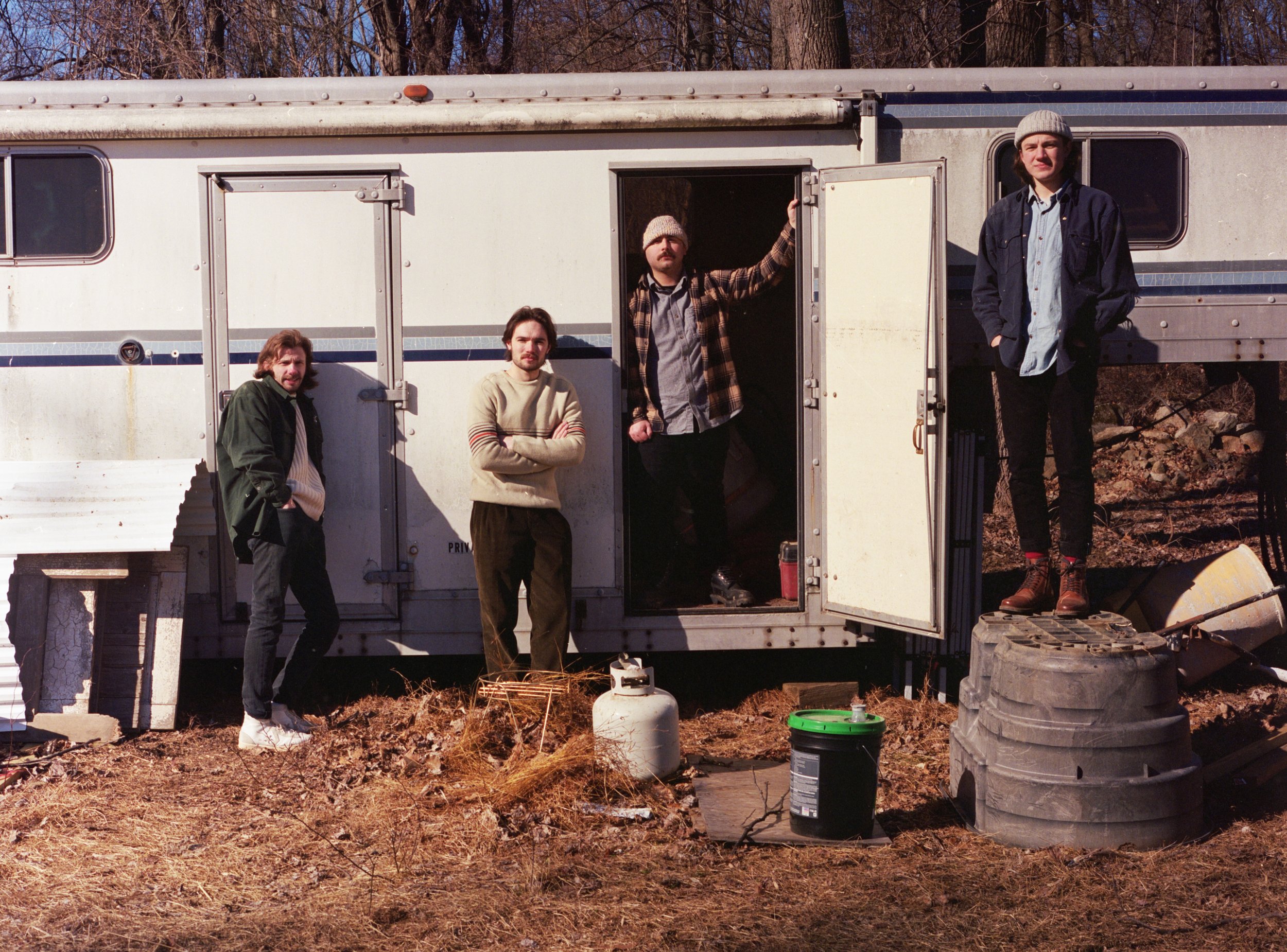by alex grainger
photo by chase denton
Nostalgic laced indie-pop track “the cute girl from brewster hall” shares the all too familiar story of a kid named rufus’ first love. First loves are important and impactful. For Rufus this love came with more than one first, as they met “the cute girl from brewster hall” during their first year in the US and was the first experience they had with the physical and emotional intimacy culture of the Western world.
a kid named rufus’ highly anticipated debut album whatever works showcases range through not only the vulnerable stories of culture shock to love to coming out but also through how these are presented in an exploration of genres from indie-pop to alternative rock. Treating the album as a movie soundtrack, the third single “the cute girl from brewster hall” fits in as the bubbly rom-com. Their love story comes to life in the captivating Wes Anderson inspired music video. The vibrant cinematic video is a true representation of Rufus’ own visual identity. Take part in the sonically driven cinematic experience of “the cute girl from brewster hall” and read more about the kid named rufus below!
You wrote “the cute girl from brewster hall” as a gift to the girl you had been dating. Can you take us through the writing and recording process from when it was initially written to the completed single?
a kid named rufus: “Absolutely! The story behind ‘the cute girl from brewster hall’ is spot-on with the lyrics. I was working the front desk at Brewster Hall, a freshman dorm at Syracuse University, when this very attractive girl swiped her ID. We were matched on Tinder the following day, and we started dating soon after. A few months later, I had the opportunity to travel to Los Angeles for work. While I was there, I met with my two go-to collaborators, Joe Kelleher and Mimika Muscillo, and we wrote and produced the first version of the song in one session. Joe and Mimika have been a part of a few of my projects in the past, including my debut EP, so creating this track was an effortless process. By the end of the day, the fundamental elements were done and I then took care of the production from my dorm room in Syracuse.”
The single “sonically walks along a tightrope of familiarity and excitement of the unknown.” It pushes the boundary of the typical indie-pop sound. What drove you to create this experimental sound and how do you feel it supports the narrative of “the cute girl from brewster hall?” Further, how does this sound fit into the overall sound of your debut album whatever works?
a kid named rufus: “I wanted to create a sound that was both familiar and excitingly new, something that could both be heard and seen. I wanted to capture the grandeur of a movie soundtrack and the commercial appeal of a pop hit. When I started working on this album I knew I wanted to create a production that was cinematic and experimental, but still within the confines of indie music. This was especially true for ‘the cute girl from brewster hall’ because the story behind it was so special and unique, almost like something off a rom-com film. By treating each song like a movie soundtrack, rather than individual singles,we were able to explore and create an album beyond the traditional boundaries of indie-pop music.”
“the cute girl from brewster hall” is, as you note, “deeply rooted within the overarching theme” of whatever works. How does this song about your first love fit into the story and message of whatever works?
a kid named rufus: “Living in the US for the first time was a huge shock for me, coming from Malaysia. My debut album, whatever works, reflects the struggles I faced during my transition: culture shock, financial struggles, anxiety, heartbreak, coming out, and being a teenager in a strange new world. It just so happened that I met the ‘cute girl from Brewster Hall’ during this time. This was my first experience with physical and emotional intimacy, something that is taken for granted in the Western world, but not so much in the East. The culture surrounding relationships, dating, and hooking up is vastly different in the US compared to other parts of the world. It was a huge learning experience for me that would have never happened if I had stayed in Asia.”
First loves are incredibly impactful whether through heartbreak, growth, or happiness. How, if at all, has your first love made a lasting impression on your life both personally and as a musician?
a kid named rufus: “I’ve actually avoided writing about love until now. My romantic life has definitely had a lasting impression on me, both personally and as a musician. I’m in a committed relationship now and my partner is incredibly supportive. Falling in and out of love has taught me a lot and has been crucial to my personal growth. Each experience has made me a better person and has shaped me into who I am today. I’ve become more inspired to write about love in my music now, which is something I hadn’t done before.”
The music video for “the cute girl from brewster hall” was inspired by Wes Anderson’s film style. What was the creative process behind visually translating this song into such an iconic and captivating inspired style? How do you think this Wes Anderson inspired video supports the story of your first love?
a kid named rufus: “When I flew to New York from Kuala Lumpur two years ago, I watched The Grand Budapest Hotel on the plane, and I was immediately enchanted by Wes Anderson’s use of symmetry, composition, and color. His style felt very representative of my own visual identity, and I wanted to capture that same feeling for my music video for ‘the cute girl from brewster hall.” The themes and colors of the song lent themselves perfectly to the whimsical and playful nature of a Wes Anderson-inspired video. It was a perfect way to express the lightheartedness of the song and the story behind it.”
“the cute girl from brewster hall” was the first music video you have ever shot. Walk us through the exciting experience of this 48-hour shoot? What was your reaction to seeing your first complete music video?
a kid named rufus: “I was connected with the production company Working Holiday based in Nashville, and knew immediately that Chase Denton and Frank Paris were the right people to collaborate with when I saw their treatment. A few weeks later, I went to Nashville to film the music video for ‘the cute girl from brewster hall,’ and we booked a retro-looking boutique hotel and hired an actress to play ‘the cute girl’ (shout out Nancy). It was my first time ever on a film set and it was quite a process; with a stylist, dressing room, call sheet and schedule, and having to do multiple takes of the same thing. When I saw the final cut, I was amazed; I knew it was going to turn out perfect. I’m glad I had the opportunity to shoot a professionally made music video, as I believe it is a great experience, and it’s been long overdue for me.”
“the cute girl from brewster hall” is the third single off whatever works. Why did you decide to release this as a single instead of debuting the song within the story of the album?
a kid named rufus: “I wanted to create an impactful moment for each of the songs on this album, rather than just focusing on the release of the album as a whole. There are so many amazing songs on this record that deserve to be highlighted, especially ‘the cute girl from brewster hall,’ so I decided to release multiple singles so that each one could have its moment in the spotlight.”
whatever works drops July 14th and takes the listener on the very personal journey of your first year in the United States. Can you tell us a little more about the story and sound of the album?
a kid named rufus: “whatever works is a deeply personal album that takes listeners on a journey through my first year in the United States. From culture shock, to financial struggles, to dealing with social anxiety and impostor syndrome, to falling in and out of love, to coming out — this album details my experience as an adult living in a new place. Musically, it draws from a range of genres, ranging from indie-pop to alternative-rock and everything in between.”
July can’t come fast enough… what can we expect in these next months leading up to your debut album’s release?
a kid named rufus: “We have a couple more singles and music videos lined up, all of which I can’t wait to share!”





